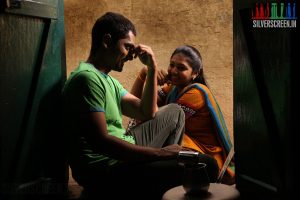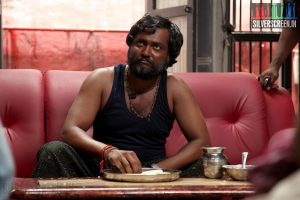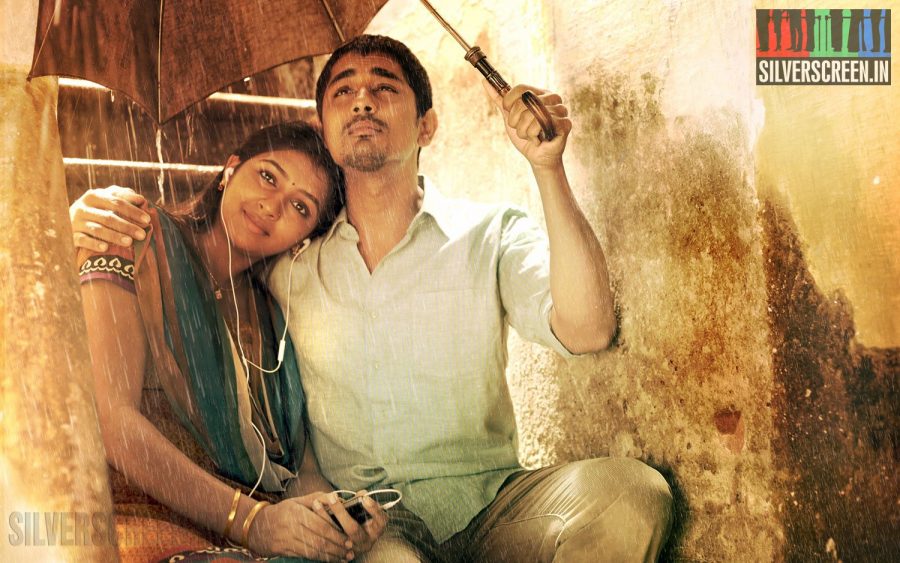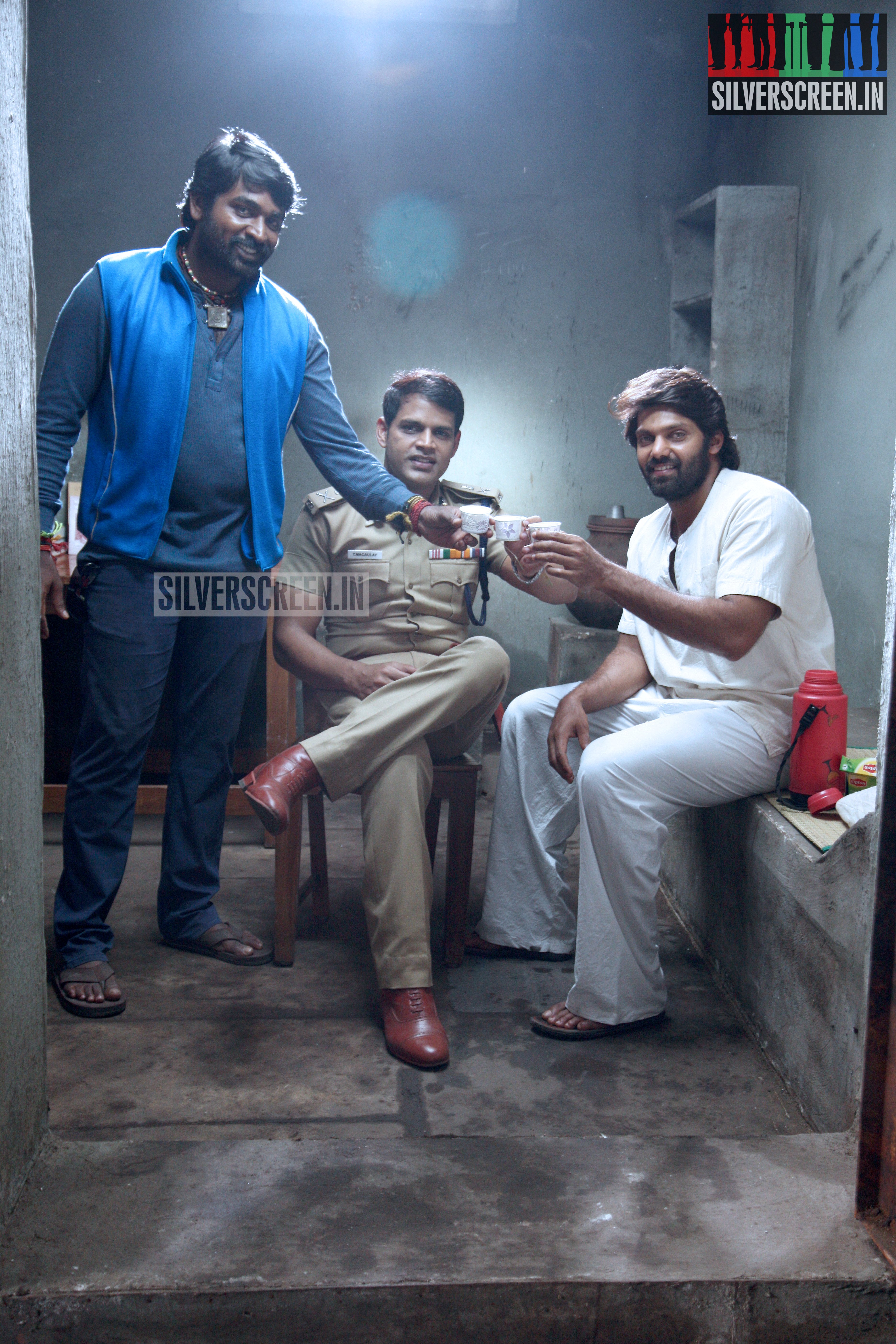
Jigarthanda starring Siddharth, Lakshmi Menon, Bobby Simha; directed by Karthik Subbaraj
Karthik Subbaraj takes pleasure in the rousing introductory shot. He does it with exaggerated flair, deliberately building up tension. While his filmmaking is quite unorthodox, especially for Tamil cinema, Subbaraj is quite traditional with his introductions. Attribute it to his love for Rajinikanth, or perhaps, simply, to the fact that he knows the power of a great opening moment. Subbaraj knows how to create a din.
Jigarthanda begins at a small cinema shack in the midst of its nightly ritual: an old Sivaji flick is playing on the screen, while a few stragglers dot the area, as do several empty bottles of liquor. A bunch of (unusually) sober men are tucking into their meal at one of the tables. They exchange a glance, suddenly turn around, and pound a stream of bullets at a hapless drunk who is sitting a few feet away.
And when the last echo of the blast dies down, we hear TM Soundararajan still singing blithely. As unruffled as Sivaji; who now holds a baby aloft, and croons to him. His voice lingers for a long time. Much after the moment has passed.
…Valar Podhigai malai thondri
Madurai nagar kandu
Polindha thamizh mandrame…
Yes, Subbaraj is careful about his introductory moments indeed. He chooses them wisely. With his protoganist Karthik (Siddharth) he eschews flair. A shot of Siddharth pulling on a jacket, and walking towards the stage of a TV show is set to a rising crescendo of applause in the background. And when the camera finally rests on his face, Siddharth wears a nervous smile. He’s introduced as an upcoming director whose movie is up for review with the judges. And, much as Subbaraj insisted in our interview that Jigarthanda’s Karthik doesn’t take after him, we can’t help but harbour a tiny suspicion. It’s a familiar setting to the director. A reality show that promotes young filmmakers, a nervous young man called Karthik whose career is poised on the verdict…and, an unimpressed movie critic (Nasser) who slams his work. Kuppai madri iruku, he says.
Subbaraj slows the dialogue down. Exaggerated flair.
Of course, Sethu (a terrific Bobby Simha) is given a stirring introduction as well. He’s in the middle of a day’s work: murdering a journalist who’d had the audacity to write about him. And as the scribe screams for mercy, Subbaraj slowly pans the camera onto Sethu, accompanied by a thunderous score. Sethu is sitting cross-legged on the rear bumper of an old Benz, rugged and unshaven with stained teeth, twirling his wild goatee. A cold smile plays on his lips. Ezhudhinadhu thaan ezhudhina, en photo potrlukalamla? He laughs, before setting him on fire with the stub of his cigarette.
Jigarthanda is full of these little Tarantino influences. That lone, quirky theme music which gives little or no warning about what is to come. Those eclectic beats, so rustic, yet so outlandish, but always in sync (and very Santhosh Narayan). This number that plays over and over again when Sethu is on screen, ripping out intestines and splashing blood over the floor, and being murderous in general. It is eerie, yet strangely funny. It is also unnerving. Jigarthanda is a ‘gangster musical’ alright, one that celebrates the rowdy way of life.

Jigarthanda starring Siddharth, Lakshmi Menon, Bobby Simha; directed by Karthik Subbaraj
There’s not much by way of romance in Jigarthanda (not as much as the posters claimed, anyway). Lakshmi Menon as Kayal, plays the daughter of an idli-seller, and appears in a few inconsequential frames; and here, we can’t help but wonder at the possibility of a screenplay free of romance. Subbaraj seems a little half-hearted about letting that go. Kayal has an interesting profile, nevertheless – a dash of vindictive fury when we least expect it.
Recommended
Jigarthanda is also long, yes – but there are quite a few surprises that make up for it. There’s violence, but there’s also humour – often in quick succession. And that’s primarily thanks to Oorni (Karunakaran) whose unique brand of humour is employed well. And who definitely appears in more frames than the heroine. He’s a bangle-seller at the famous Meenakshi temple, and an extremely devoted sidekick with some witty one-liners. He can laugh at himself, and elicit laughter just as well.
And even though the director is not in front of the camera, his phantom presence is felt through-out the movie: in those oodles of Rajinikanth, the quirky Tarantino moments, and more importantly, in that rousing final scene. It’s a different Siddharth here; a different Simha, and a Karthik Subbaraj who is much more than what he seems.
Oh, how the tables have turned.
The Jigarthanda review is a Silverscreen original article. It was not paid for or commissioned by anyone associated with the movie. Silverscreen.in and its writers do not have an advertising relationship with movies that are reviewed on the site.

